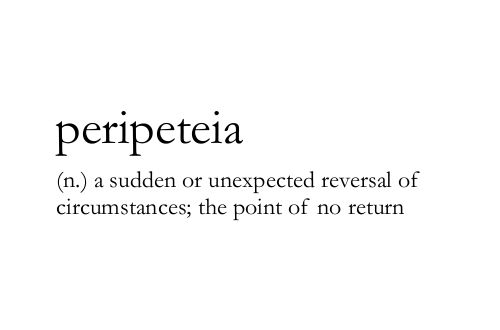
peripeteia [per-uh-pi-tahy-uh, -tee-uh] ExamplesWord Origin noun
- a sudden turn of events or an unexpected reversal, especially in a literary work.
Also per·i·pe·ti·a, pe·rip·e·ty [puh-rip-i-tee] /pəˈrɪp ɪ ti/. Origin of peripeteia 1585–95; Greek peripéteia sudden change, equivalent to peripet(ḗs) literally, falling round (peri- peri- + pet-, base of píptein to fall) + -eia -y3 Examples from the Web for peripety Historical Examples of peripety
Two parts of the Plot, then, Peripety and Discovery, are on matters of this sort.
Aristotle
But Theodore Kremer, who very possibly never heard of peripety, would do exactly the same thing.
Heywood Broun
When a pupil brings in a play in favor of polygamy, Baker declines to argue but talks instead about peripety.
Heywood Broun
Has the conception of the peripety, as an almost obligatory element in drama, any significance for the modern playwright?
William Archer
In the third act of Othello we have a peripety handled with consummate theatrical skill.
William Archer
British Dictionary definitions for peripety peripeteia peripetia peripety (pəˈrɪpətɪ) noun
- (esp in drama) an abrupt turn of events or reversal of circumstances
Derived Formsperipeteian or peripetian, adjectiveWord Origin for peripeteia C16: from Greek, from peri- + piptein to fall (to change suddenly, literally: to fall around) Word Origin and History for peripety peripeteia n.
also peripetia, 1590s, from Greek peripeteia “a turn right about; a sudden change” (of fortune, in a tragedy), from peri- “around” (see peri-) + stem of piptein “to fall” (see symptom).
 Liberal Dictionary English Dictionary
Liberal Dictionary English Dictionary